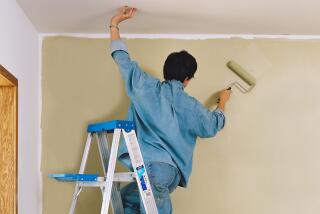What Does It Take to Turn a House Into a Home?
- Share via
William H. Huber of Ventura complains that the word house seems to have vanished from the language, at least the language of advertising.
“My dictionary says house is ‘a building for human habitation.’ On the other hand it says a home is “the social unit formed by a family living together.”
He complains that real estate dealers invariably use the word home when advertising or showing a house. “They will show you an empty, never-occupied structure and say, ‘Now here’s a lovely home.’ ”
Huber recalls that someone (I believe it was Edgar A. Guest) once said, “It takes a heap o’ livin’ to make a house a home.”
At least it sounds like Guest. Guest was always reducing great truths to folksy homilies in which he often substituted apostrophes for the terminal letters of words.
I too have noticed the use of home to describe a new, unoccupied, never-lived-in house, and have felt mildly put out by it. I believe it came into practice after World War II, when every returning veteran wanted a home and real estate salesmen were eager to put him into one.
My dictionary (Webster’s New World) gives several definitions for home , and each suggests something more than just a house. It is the place where one was born, or where one’s family lives, or simply where one hangs one’s hat. House , on the other hand, is defined as “a building for human beings to live in.”
Thus, to quote the late, notorious New York madame Polly Adler out of context, “a house is not a home.”
Undoubtedly real estate agents use the word home exactly because it connotes warmth, comfort, togetherness, which is what people really want when they buy an arrangement of pipes, wires, fixtures, two-by-fours and shingles. One can hardly imagine a real estate salesperson saying, “Now this is a lovely house.”
So, as much as we may resent it, houses are conceived of, in the minds of real estate agents and in the minds of prospective buyers, as homes . There really isn’t a great deal of harm in it.
Equally fixed in the language is the term pre-owned for used in advertising used cars. Used cars have a bad reputation, just as used car dealer has become a synonym for a sharp or dishonest trader. One rarely hears the term used cars any more in radio ads. And, especially, one never hears of a used Mercedes Benz. One assumes that Mercedes Benzes are never used, merely owned.
Used car dealers used to say that their automobiles had been driven only by little old ladies in Pasadena. Pre-owned, however, avoids that obvious falsehood. And to say that a Mercedes is pre-owned is to imply that it was owned by a gentleman of taste and means who gave it more attention than he gave his wife.
Of course, when one buys a house from people who have lived in it a long time one may indeed be buying a home, though it is a home only to its occupants. Perhaps Aaron Spelling thinks of that 56,000-square-foot house he is building in Holmby Hills as a home, or a future home, but at this point I can’t think of it as anything but a hotel.
The word home suggests a certain familial warmth and permanence; love, companionship, sharing little chores, having pets, maybe even having children, none of which can be guaranteed as forthcoming when one builds or buys a house.
It will take hours of reading by the fireplace and mowing the lawn and taking out the trash.
I don’t know what hopes Mr. Spelling has for his house, but I suspect he will have to do a heap o’ livin’ to make it into a home.
I believe I can say my wife and I live in a home. We have lived in the same house for nearly 40 years, in fairly amicable circumstances. We raised two sons in it, and they are happily married and living in their own homes with their families. That ought to give us the right, I think, to call our house a home.
I just hope my wife’s plans for major remodeling don’t turn it back into a house.
More to Read
Inside the business of entertainment
The Wide Shot brings you news, analysis and insights on everything from streaming wars to production — and what it all means for the future.
You may occasionally receive promotional content from the Los Angeles Times.










